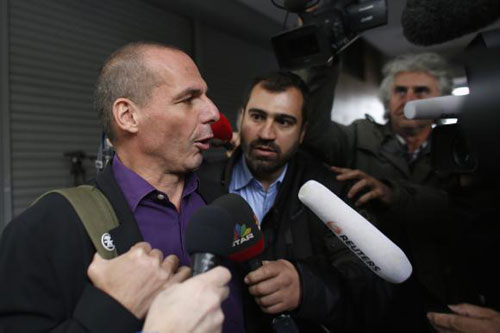
ATHENS — Meetings of G20 Finance ministers and European Union leaders top and tail this week with Greece’s fate uppermost in policymakers’ minds and global turbulence caused by diverging monetary policies and cheap oil coming a close second.
The central bank world has been upended by a steepling fall in oil prices and the effect that may have on inflation and growth, and the prospect of the European Central Bank (ECB) creating ₣1 trillion out of thin air.
The Swiss National Bank caused currency turmoil by abruptly ending its Swiss franc cap. Impromptu interest rate cuts have followed from India to Australia and Canada to Denmark, while China has cut bank reserve requirements.
On the other side of the ledger, the prospect of a first United States interest rate rise this year highlights the very different directions major central banks are heading in.
A by-product of that is the dollar being driven higher while stimulus from the ECB and Bank of Japan, among others, drives other major currencies lower.
All that will be front and centre for Finance ministers and central bankers from the Group of 20 nations who meet in Istanbul today and tomorrow, as will the perennial debate about countries that can afford to do so spending more to generate demand.

“The rest of the world cannot depend on the United States to be the sole engine of growth,” Treasury Secretary Jack Lew told US lawmakers last week.
Germany, with its giant current account surplus, has consistently rejected that approach and last year balanced its budget for the first time in more than four decades.
- Chamisa under fire over US$120K donation
- Mavhunga puts DeMbare into Chibuku quarterfinals
- Pension funds bet on Cabora Bassa oilfields
- Councils defy govt fire tender directive
Keep Reading
Lew said he saw no signs of active currency manipulation and officials from other G20 countries do not expect Washington to complain while its economy is growing robustly, something a strong US jobs report testified to on Friday.
The economics debate in Turkey has taken an interesting turn with President Tayyip Erdogan pressuring the central bank to cut rates more sharply and stating that would lower inflation.
Sweden could be the latest to adopt unconventional policies when its central bank meets. The Riksbank has said it could take new steps as early as its meeting on Thursday. These could include negative rates, offering cheap loans to banks and buying bonds.
The Bank of England’s quarterly inflation report must surely cut its inflation forecasts and implicitly push back the timing of a first United Kingdom rate rise.
“We currently believe it is borderline as to whether the Bank of England starts to raise interest rates at the end of this year or holds fire until early 2016,” said Howard Archer, chief UK and European economist at IHS Global Insight.
Greek Prime Minister Alexis Tsipras will attend his first European Union (EU) summit on Thursday having failed to win support for a debt renegotiation and easing of austerity. The day before, the Eurogroup of eurozone finance ministers will meet to pave the way.
The eurozone’s position has not shifted despite a Greek charm offensive around EU capitals and the ECB has upped the ante by making Greek banks ineligible for its funding operations, something it didn’t have to do until the Greek bailout expires at the end of the month.
“As things stand we consider the most likely outcome to be a Eurogroup offer of a new third programme,” said Deutsche Bank strategist George Saravelos.
— Reuters










